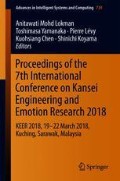Abstract
Factorization of the Happiness Index domains are performed for the purpose of identifying the underlying factors that can define and explain happiness issues that is intended to capture the attention of the university top management and policy makers. In this study, the exploratory factor analysis component method is used to identify underlying dormant factors of happiness domain that other tools may not be able to highlight. Based on the PERMAITM happiness index model, it was discovered that, Accomplishment was located consistently at 65% and below across the university’s campuses, faculties and job categories. This is an indication that people are moderately happy [1] with a high probability of not feeling happy. This domain was found to have an initial impact on the level of happiness of the university community based on the calculation of PERMAITM happiness index. Based on the responses of 9,654, factor analysis via principal component method was performed on 14 items of Accomplishment domain. Factor analysis has enabled two sub-domains under the Accomplishment domain i.e., Self-Accomplishment and Self-Efficacy. It is hoped that the findings can assist the university’s top management to focus on the pertinent issues on accomplishment and its sub-domains can impact the happiness of the university’s community.
Access this chapter
Tax calculation will be finalised at checkout
Purchases are for personal use only
Preview
Unable to display preview. Download preview PDF.
References
Peter, H., Michael, A. Oxford Happiness Inventory, Oxford University (2002).
Sonja, L. The How of Happiness: A New Approach to Getting the Life You Want, Penguin Books (2008).
Ed, D, Robert, BD. Happiness: Unlocking the Mysteries of Psychological Wealth (2008).
Ministry of Education Malaysia. Malaysian Education Blueprint 2013 - 2025. Preschool to Post-secondary Education (2013).
Gavin, J.H., Mason, R.O.: The Virtuous Organization: The Value of Happiness in the Workplace - Organizational Dynamics, Pergamon (2004).
Money, A.G., Aguis, H.: Video summarization: A conceptual framework and survey of the state of the art. 19(2), 121-143 (2008).
Wright, T.A., Cropanzano, R.: Well-being, Satisfaction and Job Performance: Another Look at the Happy/Productive Worker Thesis. In Academy of Management Proceedings 1, 364-368 (1997).
Scupin, R. The KJ method: A technique for analyzing data derived from Japanese Ethnology. Human Organization, 56, 233-237 (1997).
Martin, B., Hanington, B.: Universal Methods of Design: 100 Ways to Research Complex Problems, Develop Innovative Ideas and Design Effective Solutions. Rockport Publishers (2012).
Burton, K. A study of motivation: How to get your employees moving. Management, 3(2), 232-234 (2012).
Coakes, S.J., Steed, L. SPSS Version 20 for Windows: Analysis Without Anguish, John Wiley and Sons (2012).
Hair, J.F., Black, W.C., Babin, B.J., Anderson, R.E.: Multivariate Data Analysis (7th Ed.), Pearson Education International (2007).
Eugene, P. IZA: World of Labor Report (2013). https://www2.warwick.ac.uk/newsandevents/pressreleases/rise_in_workers146/
Author information
Authors and Affiliations
Corresponding author
Editor information
Editors and Affiliations
Rights and permissions
Copyright information
© 2018 Springer Nature Singapore Pte Ltd.
About this paper
Cite this paper
Mahmud, Z., Jaafar, N., Ibrahim, N.H. (2018). Factorization of Accomplishment Domain of PERMAITM Model. In: Lokman, A., Yamanaka, T., Lévy, P., Chen, K., Koyama, S. (eds) Proceedings of the 7th International Conference on Kansei Engineering and Emotion Research 2018. KEER 2018. Advances in Intelligent Systems and Computing, vol 739. Springer, Singapore. https://doi.org/10.1007/978-981-10-8612-0_87
Download citation
DOI: https://doi.org/10.1007/978-981-10-8612-0_87
Published:
Publisher Name: Springer, Singapore
Print ISBN: 978-981-10-8611-3
Online ISBN: 978-981-10-8612-0
eBook Packages: EngineeringEngineering (R0)

